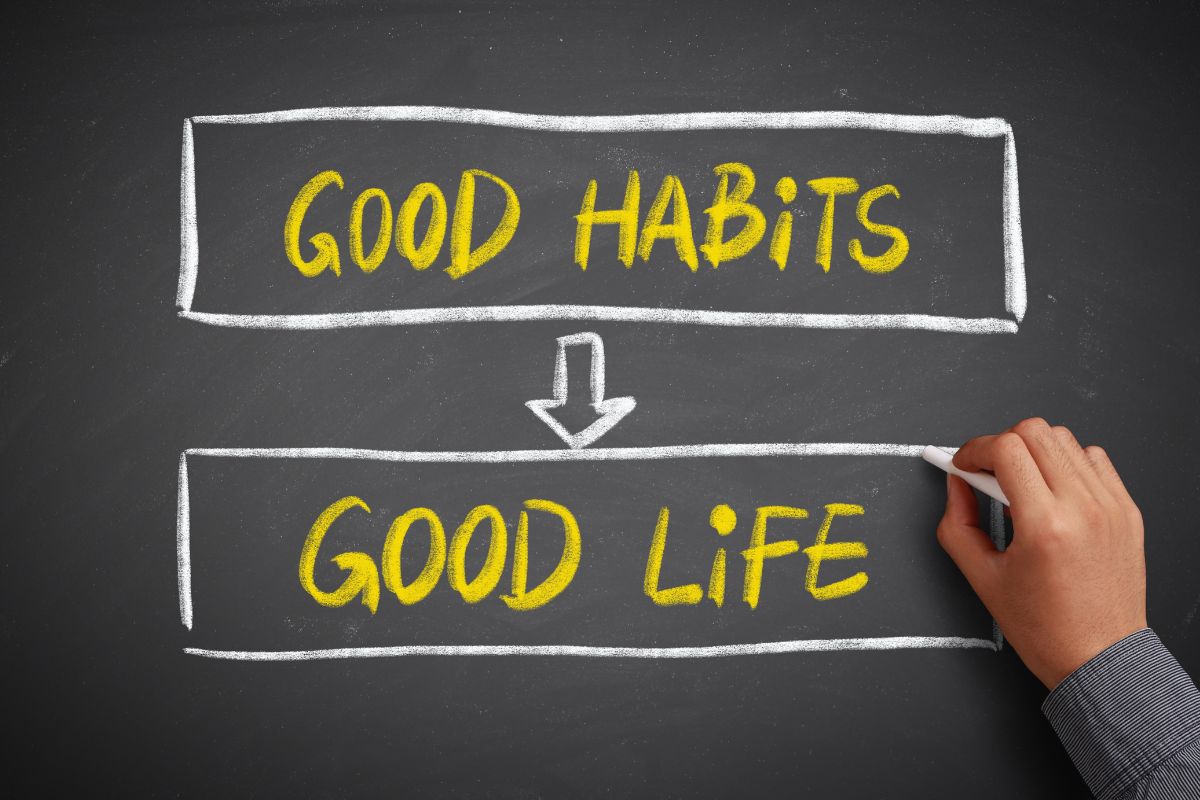What is a lifestyle?
A lifestyle is essentially the unique blueprint that shapes how individuals or groups live and navigate their daily existence. It encompasses a broad spectrum of elements that encapsulate their way of life, encompassing their habits, routines, preferences, values, social behaviors, and choices.
Picture it as the multifaceted collage that defines how someone goes about their day – from the little habits they have in the morning to their larger life choices. It’s this complex blend of what they like, believe in, and how they engage with the world around them.
Lifestyle choices affect everything
It’s not just about what people do; it’s about what they think, what they love, and how they express themselves. Their lifestyle influences their relationships, how they spend their free time, the things they buy, the way they eat, and how they take care of themselves.
Factors like culture, society, income, surroundings, and personal experiences all play into someone’s lifestyle. Sometimes, these choices are intentional – like picking a hobby or career – and sometimes they’re more subconscious, just things that naturally happen based on their surroundings or upbringing.
In the end, it’s a unique blend of personal choices and external influences that paint a picture of how someone lives, interacts, and experiences the world around them.

There are some different lifestyles
-
Minimalist Lifestyle
- Minimalism revolves around simplifying life by decluttering possessions, streamlining needs, and focusing on essential items. It emphasizes the removal of unnecessary material possessions, promoting a clearer mindset, reduced stress, and increased freedom.
-
Urban Lifestyle
- The urban lifestyle is centered in cities, characterized by fast-paced living, diverse cultural experiences, access to numerous amenities like restaurants, entertainment venues, job opportunities, and a bustling social life.
-
Rural or Country Lifestyle
- Contrasting the urban lifestyle, the rural lifestyle is more serene, often found in countryside or small-town settings. It entails a slower pace, closer connection to nature, agricultural activities, and a strong sense of community.
-
Bohemian Lifestyle
- Bohemian living is artistic, free-spirited, and unconventional. Individuals in this lifestyle emphasize creativity, self-expression, and often favor eclectic, non-traditional choices in clothing, decor, and lifestyle.
-
Nomadic Lifestyle
- A nomadic lifestyle involves frequent travel and a lack of a permanent residence. Nomads are explorers, moving from place to place, seeking new experiences, cultures, and adventures.
-
Fitness and Wellness Lifestyle
- This lifestyle prioritizes health and well-being, involving regular exercise, balanced nutrition, mindfulness practices, meditation, and a focus on mental and physical wellness.
-
Luxury Lifestyle
- Often associated with opulence and wealth, a luxury lifestyle centers around high-end purchases, exclusive experiences, lavish living standards, and indulgence in luxury goods and services.
-
Digital Nomad Lifestyle
- This lifestyle merges work with travel by utilizing technology to work remotely from different global locations. Digital nomads seek flexibility, diversity, and experiences while maintaining their professional careers.
-
Family-Centric Lifestyle
- Family-centered living prioritizes family values, fostering close relationships, creating a nurturing home environment, and dedicating time and resources to family members.
-
Frugal or Minimalist Lifestyle
- This lifestyle revolves around budgeting, conscious spending, and reducing expenses to live within one’s means. It emphasizes financial discipline, cutting down on unnecessary costs, and mindful consumption.
-
Entrepreneurial Lifestyle
- Embraced by entrepreneurs, this lifestyle involves dedication, risk-taking, and a focus on building businesses or ventures. It often requires long hours, dedication, and a flexible approach to work-life balance.
-
Eco-friendly or Sustainable Lifestyle
- Focused on environmentally conscious choices, this lifestyle advocates for reducing waste, using renewable resources, adopting eco-friendly products, and making decisions that minimize the individual’s impact on the planet. People with a sustainable or ecological lifestyle are accustomed to using our products, such as the reusable sandwich wrapper and reusable snack pouches.
Create your own lifestyle
Determining the lifestyle that aligns best with your personality and aspirations involves a comprehensive self-discovery journey. Here’s a detailed guide to help you identify the lifestyle that resonates most with your inner self:
Reflect on Personal Values
To begin, delve into understanding your core values. Take time to explore what truly matters to you in life. Is it sustainability, family, personal growth, or creativity? Identifying these fundamental values provides a compass that guides your decisions and influences lifestyle choices aligned with what holds significance to you.
Self-Reflection on Interests and Passions
Engage in self-reflection to unearth your interests and passions. Reflect on the activities that genuinely excite and inspire you. Whether it’s engaging in artistic pursuits, sports, literature, culinary adventures, or outdoor activities, acknowledging your hobbies and passions can help shape a lifestyle that integrates these elements into your daily routine.
Assess Personal Goals and Aspirations
Take stock of your short-term and long-term goals. What aspirations and dreams do you have for yourself? Evaluating your ambitions can guide you toward a lifestyle that aligns with these objectives. It might involve career aspirations, personal development goals, or aspirations for giving back to the community.
Evaluate Lifestyle Preferences
Consider your lifestyle preferences and the environments in which you thrive. Are you more inclined towards urban living with its hustle and bustle, or do you prefer a quieter, countryside setting? Assessing your preferences regarding social interactions, work-life balance, and living environment helps sculpt a lifestyle conducive to your comfort and well-being.
Consider Financial and Time Constraints
Acknowledge the practical aspects such as financial resources and time commitments. Reflect on how much time and financial investment you can realistically allocate to support the lifestyle you desire. This awareness can help you design a lifestyle that’s attainable and sustainable within your means.
Experiment and Explore
Embrace experimentation and exploration. Try out new activities, hobbies, or lifestyle changes to gauge their resonance with your personality and values. This hands-on approach allows you to test different lifestyles and identify elements that bring fulfillment and contentment.
Seek Guidance and Feedback
Engage in conversations with friends, mentors, or professionals who can offer guidance and feedback. Discussing your aspirations and thoughts with others can provide valuable insights and perspectives that you might not have considered.
Discovering the lifestyle that best suits you is an ongoing process of self-discovery and adaptation. Embrace this journey with an open mind and a willingness to explore different paths until you find one that aligns harmoniously with your inner self and aspirations. A good choice is to use our products, as they are reusable and environmentally friendly. Discover our reusable sandwich wrappers and snack bags.
Positive lifestyle choices means a healthier life
Making positive lifestyle choices significantly impacts overall health and well-being. Here are several reasons why making good lifestyle choices leads to a healthier life:
-
Enhanced Physical Health
- Embracing a healthy lifestyle is pivotal for overall physical well-being. Regular exercise routines encompass a wide range of benefits beyond just physical fitness. Cardio exercises, strength training, or yoga not only improve physical endurance but also enhance flexibility, muscle strength, and overall agility.
- These activities help in maintaining a healthy weight, improving cardiovascular function, and reducing the risk of chronic diseases such as heart disease, type 2 diabetes, and hypertension.
- In addition to exercise, a well-balanced diet plays a crucial role in nourishing the body. Consuming a variety of nutrient-dense foods like fruits, vegetables, whole grains, lean proteins, and healthy fats provides essential vitamins and minerals vital for optimal bodily function.
- These dietary choices contribute to robust overall health, ensuring that bodily systems operate efficiently. Adequate sleep is equally essential; it allows the body time to repair, rejuvenate, and restore energy levels, promoting optimal health and well-being.
-
Reduced Risk of Diseases
- Making conscious lifestyle choices significantly mitigates the risk of developing various chronic diseases.
- Mindful dietary habits, such as choosing nutrient-rich meals, moderating sugar and salt intake, and avoiding processed foods, substantially reduce the risk of heart disease, diabetes, and obesity.
- Regular physical activity plays a pivotal role in weight management and overall health. It not only aids in weight control but also strengthens the immune system and lowers the risk of certain cancers. Additionally, steering clear of tobacco products and moderating alcohol consumption are crucial steps in disease prevention.
- These lifestyle choices not only help in better disease management but also significantly reduce the likelihood of developing health conditions associated with these substances, contributing to an overall healthier and more fulfilling life.
-
Improved Mental Health
- Lifestyle choices play a crucial role in mental well-being. Regular physical activity significantly impacts mental health by stimulating the release of endorphins—neurotransmitters responsible for feelings of pleasure and happiness.
- These endorphins not only act as natural mood lifters but also help in reducing stress and anxiety levels. Engaging in exercise routines such as running, yoga, or even brisk walking can alleviate symptoms of depression and anxiety, promoting a more positive mindset and overall mental wellness.
- A balanced diet is equally important; it ensures that the brain receives essential nutrients necessary for optimal functioning. Nutrient-rich foods, such as omega-3 fatty acids found in fish, antioxidants present in fruits and vegetables, and whole grains, contribute to improved brain health.
- Hydration also plays a role; proper water intake supports brain function and helps in maintaining mental clarity and focus. Additionally, adequate sleep is vital for mental health.
- Quality sleep regulates mood, enhances memory consolidation, and contributes to emotional resilience, which collectively fosters overall mental well-being.
-
Weight Management
- Maintaining a healthy weight through balanced lifestyle choices is essential for overall health and well-being. A combination of healthy dietary habits and regular physical activity is instrumental in managing weight effectively.
- A diet comprising whole foods, vegetables, lean proteins, and healthy fats, coupled with portion control, is pivotal in weight management. This dietary approach not only aids in weight loss but also helps in weight maintenance.
- Regular exercise routines, whether aerobic exercises, strength training, or other physical activities, contribute to burning calories and building lean muscle mass. A healthy weight significantly reduces the risk of obesity-related health issues, including heart disease, type 2 diabetes, joint problems, and certain types of cancer.
- Moreover, maintaining a healthy weight level promotes better energy levels, increased stamina, and overall vitality, thus contributing significantly to leading a healthier life.
-
Better Sleep Quality
- Establishing a consistent sleep schedule and adhering to good sleep hygiene practices significantly contributes to overall health and well-being.
- Quality sleep is crucial for several bodily functions and mental health. It plays a pivotal role in cognitive function, aiding memory retention, learning capabilities, and overall brain health.
- Moreover, adequate sleep is closely linked to emotional balance, regulating mood, and reducing the risk of anxiety and depression. Furthermore, quality sleep is vital for a robust immune system, as it helps in fortifying the body against illnesses and infections.
- Implementing good sleep habits, such as maintaining a regular sleep routine, ensuring a comfortable sleep environment (like a dark and quiet room), limiting screen time before bedtime, practicing relaxation techniques such as meditation or deep breathing exercises, can significantly enhance sleep quality and, in turn, contribute to overall health.
-
Increased Energy Levels
- Making healthy lifestyle choices plays a fundamental role in maintaining consistent energy levels throughout the day. Engaging in regular physical activity, whether it’s cardiovascular exercises like jogging, cycling, or strength training routines, increases circulation and oxygen flow in the body, effectively boosting energy levels.
- A balanced diet comprising whole foods, complex carbohydrates, proteins, and healthy fats provides the necessary nutrients to fuel the body and maintain sustained energy levels. Adequate hydration is equally essential; dehydration can lead to fatigue and decreased cognitive function.
- By staying properly hydrated, individuals can maintain energy levels and mental clarity.
- Incorporating these practices into daily routines, individuals can effectively combat fatigue, improve alertness, and enhance productivity, resulting in a more vibrant and energetic lifestyle.
-
Stronger Immune System
- Adopting conscious lifestyle choices significantly impacts the body’s immune response.
- A well-balanced diet, rich in essential nutrients like vitamins C, D, and E, alongside minerals such as zinc and selenium, plays a pivotal role in supporting immune function.
- Regular physical activity contributes to the efficient circulation of immune cells and antibodies throughout the body, bolstering the body’s defense against infections.
- Maintaining proper hydration ensures adequate fluid balance, facilitating the movement and function of immune cells. Effective stress management techniques, like meditation or relaxation exercises, play a crucial role in maintaining a robust immune system.
- By reducing the production of stress hormones that can suppress immune function, these practices collectively strengthen the body’s defenses, decreasing the likelihood of falling ill and improving overall health.
-
Improved Longevity
- Embracing a healthy lifestyle often correlates with an extended lifespan.
- Scientific research consistently demonstrates that individuals who uphold healthy habits, including a balanced diet, regular exercise, and avoidance of harmful substances like tobacco, generally experience longer and healthier lives.
- Engaging in these positive habits not only increases life expectancy but also amplifies the quality of life.
- Additionally, adopting good lifestyle choices helps mitigate the risk of chronic diseases, such as heart disease, diabetes, and certain cancers, thereby significantly contributing to a longer and more fulfilling life.
- The longevity benefit emphasizes the significance of making sustainable lifestyle changes for overall well-being and vitality across the lifespan.
-
Reduced Healthcare Costs
- Healthy lifestyle choices not only prevent various diseases but also alleviate the economic burden of healthcare.
- Embracing preventive measures such as regular exercise, adopting healthy dietary habits, and maintaining an optimal weight significantly reduces the risk of chronic conditions like heart disease, diabetes, and hypertension.
- This proactive approach decreases the necessity for frequent medical interventions, doctor visits, and hospitalizations, leading to diminished healthcare expenses for both individuals and society at large.
- Additionally, a reduced dependency on long-term medications and expensive medical treatments contributes to substantial savings in healthcare costs over time.
- By prioritizing a healthy lifestyle, individuals not only invest in their well-being but also alleviate the financial strain associated with healthcare.
-
Overall Well-being
- The impact of healthy lifestyle choices extends beyond physical health, profoundly influencing overall well-being.
- Engaging in regular physical activity, consuming a balanced and nutritious diet, effectively managing stress, and obtaining adequate sleep positively impact mental and emotional health.
- This holistic approach fosters an encompassing sense of well-being, enhancing mood, reducing anxiety and depression, and fostering a positive outlook on life.
- When individuals experience mental and emotional balance, they are better equipped to navigate life’s challenges, maintain meaningful relationships, and engage in activities that bring joy and fulfillment.
- Overall, a balanced and healthy lifestyle supports a higher quality of life, allowing individuals to lead more vibrant, meaningful, and satisfying lives.
-
Enhanced Social Connections
- Positive lifestyle choices often lead to increased social interactions and stronger social connections.
- Engaging in activities like group fitness classes, community events, or team sports not only promotes physical health but also fosters social bonds.
- These connections contribute to emotional well-being by providing support systems, reducing feelings of loneliness or isolation, and enhancing overall happiness.
- Meaningful social connections are integral to mental health and contribute to a sense of belonging and purpose, ultimately improving overall well-being.
-
Resilience to Stress
- A healthy lifestyle acts as a buffer against stressors encountered in daily life.
- Regular physical activity, coupled with healthy eating habits, adequate sleep, and stress management techniques, builds resilience against the negative effects of stress.
- These practices help regulate stress hormones, alleviate anxiety, and promote emotional resilience.
- Developing coping mechanisms through a healthy lifestyle equips individuals with the tools to navigate stress more effectively, contributing to improved mental and emotional health.
-
Enhanced Productivity and Performance
- Positive lifestyle choices have a direct impact on productivity and performance in various aspects of life.
- When individuals maintain a balanced diet, engage in regular physical activity, and ensure adequate sleep, they experience increased energy levels and improved cognitive function.
- This boost in energy and mental clarity positively influences performance at work, in academics, or during daily tasks.
- Furthermore, a healthy lifestyle contributes to better concentration, problem-solving skills, and creativity, allowing individuals to perform optimally in their endeavors.
-
Emotional Resilience and Coping Skills
- Maintaining a healthy lifestyle isn’t just about physical well-being—it significantly impacts emotional resilience.
- Regular exercise plays a dual role, not only improving physical fitness but also releasing endorphins that positively affect mood.
- Additionally, engaging in mindfulness practices such as meditation, yoga, or deep breathing exercises enhances emotional regulation and stress management.
- A balanced diet, rich in nutrients like omega-3 fatty acids and antioxidants, contributes to brain health and emotional stability.
- These lifestyle choices collectively build emotional resilience, allowing individuals to better cope with stress, overcome adversity, and bounce back from challenging situations.
-
Improved Self-Esteem and Self-Efficacy
- Positive lifestyle changes often lead to improved self-esteem and a stronger sense of self-efficacy.
- When individuals prioritize their health through exercise, healthy eating, and stress management, they often experience a sense of achievement and self-worth. Achieving fitness milestones or adopting healthier eating habits fosters a positive self-perception.
- Regular exercise not only enhances physical appearance but also boosts confidence by improving body image.
- Managing stress effectively and practicing self-care routines further reinforce feelings of self-worth.
- This elevated self-esteem empowers individuals to face new challenges, set realistic goals, and navigate life with a greater sense of confidence and capability.
-
Enhanced Cognitive Function
- Leading a healthy lifestyle profoundly impacts cognitive abilities in multifaceted ways.
- Physical exercise not only benefits the body but also supports brain health. It enhances blood circulation, providing the brain with increased oxygen and nutrients, thereby optimizing cognitive function.
- Studies suggest that regular exercise boosts neuroplasticity, the brain’s ability to adapt and rewire itself, leading to improvements in memory, learning, and overall mental acuity.
- Moreover, a nutrient-rich diet significantly influences cognitive performance. Foods rich in omega-3 fatty acids (commonly found in fish, nuts, and seeds) and antioxidants (found in fruits, vegetables, and certain teas) are associated with better brain health.
- These nutrients help reduce oxidative stress and inflammation in the brain, promoting sharper thinking, better focus, and improved memory retention.
- Quality sleep is another pivotal aspect of cognitive function. During sleep, the brain consolidates memories, processes information, and clears out toxins accumulated during waking hours.
- Adequate sleep, typically between 7 to 9 hours for adults, enhances cognitive processes, which are crucial for problem-solving, decision-making, and maintaining cognitive agility.
-
Reduced Environmental Impact
- Making choices aligned with a healthy lifestyle often overlaps with eco-friendly practices, fostering a reduced environmental impact.
- Opting for locally sourced foods supports regional agriculture, reduces the carbon footprint associated with food transportation, and promotes the consumption of fresh, seasonal produce.
- Moreover, choosing organic or sustainably produced foods minimizes exposure to pesticides and supports farming practices that are environmentally friendly.
- Embracing sustainable habits beyond food consumption, such as reducing, reusing, and recycling, plays a critical role in minimizing waste.
- It involves adopting practices like composting organic materials, repurposing items, and minimizing single-use plastics, thereby decreasing landfill waste and conserving resources.
- Utilizing eco-friendly products and embracing energy-efficient practices in daily life further contribute to reducing environmental impact. Selecting products made from recycled materials, using energy-saving appliances, and opting for renewable energy sources at home are steps towards sustainability.
- Additionally, choosing eco-conscious transportation modes, like walking, cycling, or using public transit, decreases carbon emissions, mitigating environmental damage and fostering a healthier planet for future generations.
-
Social Connection and Community Engagement
- Positive lifestyle choices can foster stronger social connections and community involvement.
- Engaging in group fitness activities, sports clubs, or community events not only promotes physical health but also facilitates social interactions, reducing feelings of loneliness and isolation.
- It’s not just about individual health but also about creating a network of support and camaraderie.
- Volunteer work or community initiatives related to health, environment, or social causes can create a sense of purpose and fulfillment, enriching one’s life and positively impacting the community.
- By actively participating in such events, individuals feel more connected to others and contribute to building a more inclusive and supportive society.
-
Improved Productivity and Performance
- A healthy lifestyle can significantly boost productivity and performance in various aspects of life.
- Regular exercise increases energy levels, mental clarity, and overall productivity. It’s not just about physical fitness; exercise enhances cognitive abilities, problem-solving skills, and creativity, which positively influence work or academic tasks.
- Adequate sleep is crucial for cognitive function, enhancing focus, concentration, and decision-making abilities, leading to better work or academic performance.
- Moreover, eating a balanced diet rich in brain-boosting nutrients fuels cognitive function, enabling individuals to perform tasks efficiently and effectively.
- Healthy lifestyle choices collectively contribute to better performance across professional, educational, and personal spheres.
-
Long-term Impact on Quality of Life
- Making positive lifestyle choices today can have far-reaching effects on the future. Over time, these habits accumulate to create a lasting impact on overall well-being and quality of life.
- By consistently maintaining healthy habits such as regular exercise, nutritious eating, quality sleep, and stress management, individuals can mitigate the risk of chronic diseases and sustain mental and physical vitality.
- These choices contribute to a positive aging process, preserving independence, mobility, cognitive function, and overall quality of life as individuals age.
- Taking care of one’s health now lays the foundation for a more fulfilling and active life in the long term, supporting a better quality of life even in older age.
Things to do for a positive lifestyle
To cultivate a good lifestyle that promotes a healthier life, consider these actionable steps across various aspects of your daily routine:
- Balanced Nutrition
- Focus on a diverse and nutrient-rich diet comprising fruits, vegetables, whole grains, lean proteins, and healthy fats.
- Embrace mindful eating practices, savoring your meals, and being conscious of portion sizes.
- Minimize intake of processed foods, sugary drinks, and unhealthy fats, opting for healthier alternatives instead.
- Regular Physical Activity
- Make exercise a regular part of your routine, aiming for at least 150 minutes of moderate aerobic activity weekly.
- Include strength training exercises twice a week to enhance muscle strength and overall fitness.
- Choose physical activities you genuinely enjoy to maintain consistency and make exercise more enjoyable.
- Adequate Sleep
- Establish a consistent sleep schedule, aiming for 7-9 hours of uninterrupted sleep each night.
- Create a relaxing pre-sleep routine and ensure a comfortable sleep environment to promote better sleep quality.
- Stress Management
- Engage in stress-reducing practices such as meditation, deep breathing exercises, yoga, or mindfulness to manage stress levels effectively.
- Incorporate activities like hobbies, reading, or spending time outdoors to unwind and relax.
- Healthy Relationships and Social Connections
- Foster meaningful relationships with friends and family to cultivate a strong support network.
- Participate in social activities and community engagements to alleviate feelings of isolation and loneliness.
- Avoidance of Harmful Substances
- Refrain from smoking and limit alcohol consumption to moderate levels as per recommended guidelines.
- Avoid using illicit drugs and steer clear of excessive consumption of addictive substances.
- Regular Health Check-ups
- Schedule regular health screenings and check-ups to monitor your overall health status and address any health concerns proactively.
- Mindfulness and Mental Health
- Prioritize mental well-being by practicing mindfulness, seeking professional help if necessary, and developing coping mechanisms for stress and anxiety.
- Hydration
- Maintain adequate hydration throughout the day by drinking enough water and incorporating hydrating foods into your diet.
- Personal Growth and Development
- Dedicate time to hobbies and activities that interest you, engage in continuous learning, and set achievable personal goals for self-improvement and mental stimulation.
The significance of making good lifestyle choices cannot be overstated when aiming for a healthier and more fulfilling life. Each decision, whether it’s about nutrition, exercise, sleep, stress management, social connections, or personal development, contributes significantly to overall well-being.
Feel the benefits of a positive lifestyle
By adopting a proactive approach to health through positive lifestyle choices, individuals can experience a multitude of benefits. These include improved physical health, reduced risk of chronic diseases, enhanced mental and emotional well-being, increased productivity, stronger social connections, and a positive impact on the environment.
The holistic nature of these choices ensures that every aspect of life is positively affected. Whether it’s the joy of physical activity, the nourishment of a well-balanced diet, the rejuvenation of quality sleep, or the fulfillment from engaging in community activities, each contributes to a better quality of life.
Ultimately, making good lifestyle choices isn’t merely a short-term commitment; it’s a lifelong journey towards sustainable well-being. These choices lay the foundation for a healthier, more resilient, and vibrant life, offering the opportunity to thrive in all aspects while embracing the present and securing a healthier future.










